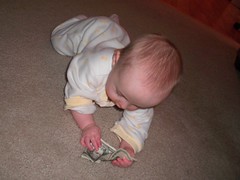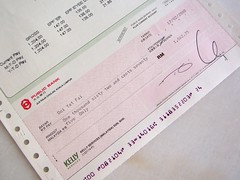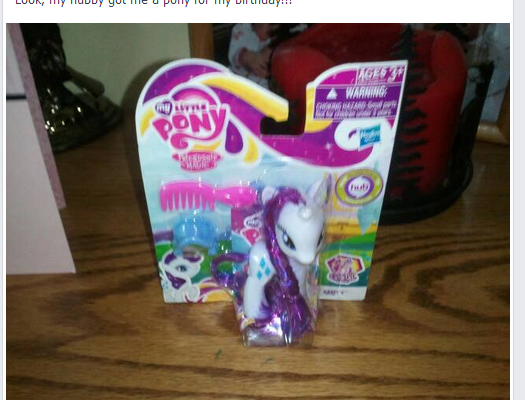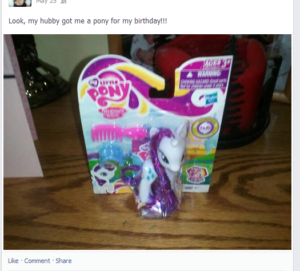What would your future-you have to say to you?
The no-pants guide to spending, saving, and thriving in the real world.
What would your future-you have to say to you?

Ten years ago, I buried myself in debt. There was no catastrophic emergency or long-term unemployment, just a series of bad decisions over the course of years.
We bought a (short) series of new cars, a house full of furniture, electronics, hundreds of books and movies, and so much more. We threw a wedding on credit and financed an addition on our house. We didn’t gamble or drink it away, we just spent indiscriminately. We have a ton of stuff to show for it and a peeling credit card to prove it.
What changed?
In October 2007, we found out brat #3 was on the way. Don’t misunderstand, this was entirely intentional, but our…efficiency caught us by surprise. It took several years to get #2. We weren’t expecting #3 to happen in just a couple of weeks. #2 wasn’t even a year old when we found out she was going to be a big sister. That’s two kids in diapers and three in daycare at the same time.
The technical term for this is “Oh crap”.
I spent weeks poring over our expenses, trying to find a way to make our ends meet, or at least show up in the same zip code occasionally.
I finally made my first responsible financial decision…ever. I quit smoking. At that point, I had been smoking a pack a day or more for almost 15 years. With the latest round of we’re-going-to-raise-the-vice-tax-to-convince-people-to-drop-their-vices-then-panic-when-people-actually-drop-their-because-we-made-them-too-expensive taxes, I was spending at least $60 per week, at least.
Interesting side story: A few years ago, Wisconsin noticed how many Minnesotans were crossing the border for cheap smokes and decided to cash in by raising their cigarette taxes. The out-of-state market immediately dried up. Econ 101.
So I quit, saving $250 per month.
Our expenses grew to consume that money, which we were expecting. (Remember, we were expecting a baby!) Unfortunately, our habits didn’t change. We still bought too much, charged too much on our credit cards, and used our overdraft protection account every month. At 21% interest!
Nothing else changed for another year and a half. My wife would buy stuff I didn’t like and we’d fight about it. I’d buy stuff she didn’t like and we’d fight about it. When we weren’t arguing about it, we’d just silently spend it all as fast as we could.
Bankruptcy was looming. We had $30,000 on our credit cards and our overdraft protection account was almost maxed out. Have you ever thought you’d have to sell your house quickly?
One day, while I was researching bankruptcy attorneys, I ran across Dave Ramsey. When I got to daycare that evening to pick up the kids, I noticed they had The Total Money Makeover on the bookshelf, so I asked to borrow it.
I read the book twice, had a very frank discussion with my wife about the possibility of bankruptcy, and we set out on the path to financial freedom together.
What made you decide to handle your finances responsibly? Or, perhaps more importantly, what’s holding you back?
If you keep doing what you’ve always done, you’re going to keep getting what you you’ve always gotten. One of the hardest things about getting out of debt is changing your habits. You need to break your habits if you’re going to get yourself to a new place, financially.
How can you do that? Habits aren’t easy to break. Ask any smoker, junkie, or overeater what it takes. There are a lot of systems to break or establish habits, but they don’t all work for everyone.
Here are my suggestions:
Habits—especially bad habits—are hard to break. There is an entire self-help niche dedicated to breaking habits. Hypnotists, shrinks, and others base their careers on helping others get out of the grip of their bad habits, or conning them into thinking it is easy to do with some magic system. How do you avoid or break bad habits?

Life is all about trade-offs. You trade your time for a paycheck. Your trade your paycheck for food, rent, and security. Don’t get so obsessed with saving and security that you forget to live your life. There are many good reasons to put your savings on hold in order to really live. Here are five of them:
1. You have an adequate emergency fund. You will never hear me advise against an emergency fund. If you don’t have one, stop reading this and get one. Go. Without an emergency fund, your budget is a financial crisis waiting to happen. With an emergency fund, you can weather life’s speed-bumps without watching them become total train-wrecks.
2. Your retirement is on autopilot. You are not allowed to stop saving and investing for retirement. Ever. Assuming you have a traditionally scheduled career that involves you working until you hit 65 and deferring a huge chunk of living until then, your income will cease when you retire. Do you know how long you will live? Do you want to spend your retirement broke and bored? Are you relying on the responsible financial management of the federal government to make sure you will still get your Social Security? Invest in your retirement and get this investment on autopilot so you can stop worrying about it.
3. Your income is set. I don’t believe in the fairy tale of a company being loyal to its employees. The aren’t. However, if you have a stable-ish job, an in-demand career, and some side-income coming from alternate sources, your emergency fund can be enough to carry you through the low times. That’s what it’s there for.
4. You have dreams. If you’ve always wanted to travel the world, follow a band on your, volunteer extensively, or anything else, it’s time to do it. Don’t postpone your passion.
5. Deathbed regrets suck. Very few people lie on their deathbed lamenting the things they did. Regrets tend to be focused on opportunities missed, skipped, or indefinitely postponed. Do the things that are important to you before it’s too late to do them. Don’t abandon your future in favor of current pleasures, but don’t forget to live, now.
Do you have any other reasons to stop saving?

With the new year looming, it’s the perfect time to review the things that may not have gone as well as planned in the current year, and plan ahead for the coming year, to make sure things go well from now on.
To get a good start in the new year, you should focus on three things.
A good budget is the basis of every successful financial plan. If you don’t have a budget, you have now way of knowing how much money you have to spend on your necessities or you luxuries. Do you really want to guess about whether or not you can afford to get your car fixed, or braces for your kid? I’ve gone over all of the essentials to make a budget before. Now is the perfect time to review that series and make sure your own budget is functional and ready for the new year.
At the same time, spend some time thinking about how your what has gone wrong with your budget over the previous year. In my case, when we got back from vacation in August, our mindset had changed a bit about spending money, and we got out of the habit of staying strictly on budget. By the time we got back on track, it was Christmas and our plans got shot, again. If it weren’t for my side hustles–money that I don’t track in the budget because the money isn’t consistent, yet–we would have had some serious problems this fall. Where have you gone wrong, and what could you do to improve next year?
In the new year, if you haven’t already done so, make sure you throw your credit cards away. The most basic law of debt reduction is, “If you don’t stop using debt, you’ll never be out of debt.” That’s why you need to set up your budget first. Make sure that your expenses are less than your income, so you can make ends meet without having to charge the difference.
How has your debt use worked out over the last year? Have you used it at all, or have you eliminated the desire to pay interest? What have you used your credit cards for? How much of that could you have done without?
Now is the time to make sure that all affairs are in order, if the worst should happen. If you die, what happens to your money? Your kids? I’ve gone over everything you need in an estate plan before, so I won’t beat that horse again. You owe it to your family to make sure they are taken care of if something should happen to you. At a bare minimum, write a will and get it notarized.
Have you putting off writing your will? You know you need one, but it’s a morbid thought, so it’s easy to put off, right? Get over it. If you love your family, you’ll do better and get your affairs together next year.
That’s a good financial start for 2011. What are you missing in your financial life?

For the past couple of years, my daughters have been riding in horse shows with a local saddle club. We’ve been lucky in that my wife’s cousin has let us borrow her horse for the shows, so costs have been minimal.
Unfortunately, that horse isn’t available this year. We knew that a few months ago, so the plan was to take a year off from the shows and focus on lessons, to get the girls some real skills. We found a great instructor at a stable about 30 miles from our house. Since we live less than two miles from the border of the biggest city in the state, that’s a comparatively short drive.
We pay her $200 per month for 1 lesson per week for both girls. They each get 30-45 minutes on the horse during each lesson.
Now that show season has started, the plan seems to have changed. The girls will be riding a different borrowed pony tomorrow. The shows cost about $50 for registration, lunch, and gas. Our club has 1 show per month, but my wife has assured me they’ll only be hitting three shows this season and limiting the number of events to keep the cost down.
The direct costs aren’t too bad, but there’s a problem with keeping-up-with-the-Joneses accessorizing. Vests and boots and helmets and belts and shirts, oh my.
I’d guess our costs for the summer will be $300 per month.
One thing we’ve been considering is buying a pony. We can get an older pony for around $500-1000. Older is good because they are calmer and slower. Boarding the thing will cost another $200 per month. We’ve been slowly accumulating the stuff to own a horse, so I’m guessing the “OMG, he let me buy a horse, now I need X” shopping bill will come to around $1500, but I’ll figure $2000 to be safe. We already have a trailer, a saddle, blankets, buddy-straps, combs, brushes, buckets, rakes, shovels, and I-bought-this-but-I-will-just-put-it-in-the-pile-of-horse-stuff-so-Jason-will-never-notice stuff. We’re certainly close to being ready to buy.
(FYI: If you’re starting from scratch, don’t think you’re going to get into horse ownership for less than $10,000 the first year, and that’s being a very efficient price-shopper.)
So we’re looking at $5400 for a horse, gear, and boarding the first year. If we cancel the lessons, by spring we’d have $2000 of that saved and most of the rest can be bought over time.
On the other hand, if we go that route, we’ll never save enough to buy the hobby farm we’re looking for.
Decisions, decisions. I should just buy a new motorcycle. Within a year, I win financially.